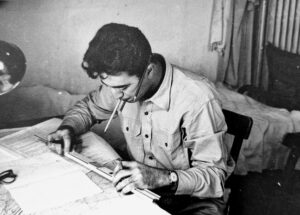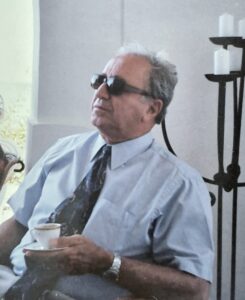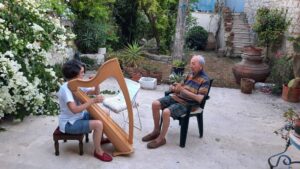 My father Erdoğan Pancaroğlu was born in Develi on a Republic Day in 1934. His family moved to Ankara when he was seven years old. After primary school, he studied at Robert College as a boarder. He then completed his master’s degree in the USA. As a certificated engineer, he worked in various institutions and companies in Turkey, as well as at the World Health Organization in Indonesia and the World Bank in Washington for many years. During this time, in line with the environmental engineering expertise he developed, he worked extensively in South East Asia as a water supply project manager. My father, who had a great deal of international experience, retired in 1996 and spent part of his time at his home in Tarabya in Istanbul, part of his time in his stone house in Alaçatı, which he had restored and later in Urla.
My father Erdoğan Pancaroğlu was born in Develi on a Republic Day in 1934. His family moved to Ankara when he was seven years old. After primary school, he studied at Robert College as a boarder. He then completed his master’s degree in the USA. As a certificated engineer, he worked in various institutions and companies in Turkey, as well as at the World Health Organization in Indonesia and the World Bank in Washington for many years. During this time, in line with the environmental engineering expertise he developed, he worked extensively in South East Asia as a water supply project manager. My father, who had a great deal of international experience, retired in 1996 and spent part of his time at his home in Tarabya in Istanbul, part of his time in his stone house in Alaçatı, which he had restored and later in Urla.
Dad was always involved in music. He played the guitar, sang, listened to music. One of the few memories I have from my first five years is a song:
The bird flies silent
Orphaned cubs
Don’t fly away, my beautiful bird
Don’t leave your nest
We may have heard this children’s song on the black and white screen of TRT, which was broadcasting a short “test” every day back then. I say we might have heard this song because even though I tried to track it down years later, I couldn’t find it anywhere. My father used to teach my sister and I this song at home while he accompanied on the guitar. He even made a tape recording. My sister, who was three years younger than me, turned it into a playful activity by singing the lyrics in broken syllables. After a while in the recording, we hear dad saying in a very sweet and singing tone, “but it can’t be”…
 The strongest image in my memory of the garden floor house in Çankaya, Ankara is music. We had a Thorens pick-up, a Grundig reel-to-reel tape recorder and dad had a large record collection of different genres of music. An orchestra led by Stokowski, singer Miriam Makeba, known as the voice of South Africa, American popular music singer Johnny Mathis, the velvet voice of Harry Belafonte, records by different guitarists, including the legendary guitarist Andres Segovia, and many more. There were also fairy tale records. A voice would narrate a tale and there would be beautiful music in the background. Among these, I was mesmerized by the music of a fairy tale that I would later learn was Rimski-Korsakov’s “Scheherazade”. The famous theme of the piece, announced by the violin and the harp, was already ingrained in me then. These 33’s must have appealed to other senses besides my ears because some of the records had teeth marks and broken pieces!
The strongest image in my memory of the garden floor house in Çankaya, Ankara is music. We had a Thorens pick-up, a Grundig reel-to-reel tape recorder and dad had a large record collection of different genres of music. An orchestra led by Stokowski, singer Miriam Makeba, known as the voice of South Africa, American popular music singer Johnny Mathis, the velvet voice of Harry Belafonte, records by different guitarists, including the legendary guitarist Andres Segovia, and many more. There were also fairy tale records. A voice would narrate a tale and there would be beautiful music in the background. Among these, I was mesmerized by the music of a fairy tale that I would later learn was Rimski-Korsakov’s “Scheherazade”. The famous theme of the piece, announced by the violin and the harp, was already ingrained in me then. These 33’s must have appealed to other senses besides my ears because some of the records had teeth marks and broken pieces!

Dad often played the guitar at home. His repertoire ranged from Turkish folk song arrangements to Latin American music, from Bach to Dede Efendi. In fact, his performances were the foundation of music at home. When my father graduated from Robert College in Istanbul and went to the US in the late 1950s to pursue a master’s degree in civil engineering, he discovered the guitar. In Washington, he studied with Sophocles Papas, a well-known guitar pedagogue and publisher of guitar music of Greek origin. Then he became self-taught. I was always surprised by the level he brought himself to.
In 1973, we moved to Istanbul for my father’s work. There was a wall piano in our house from my mother’s childhood and when I was five years old I started taking lessons from a young pianist. However, this period was short-lived as the young pianist went to Germany for her education. It was not possible to continue with another teacher. So I started playing on my own, and felt natural because dad was also mostly self-taught. On the other hand, a period that could have been structured under the discipline and direction of a teacher was spent free, playful and this taught me other things about music and beyond.
When the family moved to Istanbul, colorful concerts entered our lives. During the winter months, my father would take us to the concerts of the Istanbul State Symphony Orchestra every Saturday morning. There, I had the possibility to develop my ear with symphonic music, which had started with records at home, further. The summer months would come and the Istanbul Music Festival would start. My father would buy tickets to almost all the concerts for his family with his salary as an engineer. Let’s say he could because today that would not be possible. Choral concerts, chamber orchestras, recitals of various soloists and of course guitar recitals were among the indispensable ones. Who didn’t we listen to in the enchanting atmosphere of Hagia Irene? So by the time I was twelve years old, I had enough music in my ears that dad and I could have small conversations about.

My father was in a guitar circle. They used to share sheet music with each other. At that time, of course, there was no possibility to buy sheet music in Türkiye nor photocopying; almost all of dad’a sheet music was copied in his own handwriting. He had a pearly musical handwriting. Then, thanks to this community, good things happened after some guitar concerts. For example, there was a dinner with German guitarist Siegfried Behrend at the Divan Pub in Istanbul. It was the first time I met a professional musician and I was very impressed by what was discussed. Can Aybars from the Ankara days, Irkin Aktüze in Istanbul and Raffi Arslanyan, who was everyone’s teacher, were some of the figures in this circle.
In 1978, with my dad’s support, I took the conservatory entrance exams in Istanbul and was selected for the harp class. I felt his presence very clearly while preparing for and taking these exams. It was as if he was ahead of time but not pushing at all. He gave me the feeling that he knew that this path was natural and therefore right for me. He was happy. Shortly after, in 1980, dad accepted a job offer from the World Health Organization in Indonesia, considering, most of all, the educational opportunities it could offer us. It was a difficult decision. It was not possible to continue my musical education in Indonesia, so I went to live with my aunt in Switzerland. More than ten thousand kilometers separated us. We endured this separation from 1980 to 1988 as a family for the sake of my music education. When I went to visit my family during the holidays, we would hit the bottom of the recording industry! Jakarta had a commercial district called Blok M, which was home to an incredible number of cassette shops. Dad had discovered those and had started building a new library at home. When I was there, we used to go to these shops in the evenings almost like a sightseeing activity. Pirate copies were being massively made and put on the market then. We both bought an incredible amount of tapes and I would take some of them back to Switzerland with me and listen to them all winter.
In Geneva, a harpist mentor who was my senior had taken me under her wings: the wonderful Notburga Puskas. She was my teacher’s assistant at first, and when this position ended, she continued to give me invaluable guidance in music. Dad never withheld his hospitality and interest in my musical friendships and close friends. It was with Notburga that I noticed this first. He always tried to get to know them closely either through me or directly when it was possible. He admired them. He established a dialog with them and hosted them with very genuine feelings when the opportunity arised. My father, who was very comfortable in social relationships, left a deep impression on everyone I cared about over the years thanks to his knowledge, life experiences and extraordinary humor.

Dad was particularly strong in making decisions at critical moments. In Geneva he saw very quickly that I needed to move to a different life arrangement. He was never confused in a complicated picture. He also enrolled my sister in school in Geneva. He found us a house, litterally at high altitude, through a person he had chatted with on a plane trip to Indonesia! He trusted my sister and me; he did not doubt that his fourteen and seventeen year old daughters could manage a house on their own and take responsibility for their education. At that point, my mother started travelling back and forth to catch up with us, and with my father ten thousand kilometers away…

When I was close to completing my bachelor’s degree in Switzerland, dad came up with an idea with great foresight. He knew the reputation of the School of Music at Indiana University from his days in the US. “Do you want to go there?” he said. When I looked it up, I saw that Susann McDonald, one of the most important harp pedagogues in the world, was teaching in Bloomington, and shortly afterwards I met her in France; I liked her very much and applied to the school. In 1988, just as I was leaving for America, my father was offered a new job: this time he was going to work at the World Bank in Washington. So we had a house “nearby” where I could go on vacations. As soon as I went to the US, my father bought me a harp. He supported all my additional activities that complemented my university studies. Under Susann McDonald’s guidance and in the wonderful environment of the music school, it was as if I had been reborn. Then I graduated with the feeling that I could now fly on my own wings professionally. On the occasion of my graduation, my father carefully selected a piece from the collection of hand-carved chests he and my mother had assembled in Indonesia and brought it to Miss McDonald as a gift. Miss McDonald never forgot this gift because it was so unusual. My teacher’s house burned down completely in the mid-2000s. Miss McDonald later told me: “That beautiful chest you brought burned down too”…she expressed with sadness.
After graduation, when I was going to use my right to work for a year in the US, my father bought a car to carry my harp. That year I did not miss a single job, and I had many different professional experiences that would not have been possible at school. It was an incredible range of things: weddings, church services, musicals, theater music, funerals, inaugurations, cocktails, Christmas celebrations, parties, on the one hand; a concert in the concert hall of our Embassy in Washington, another concert at the World Bank Auditorium, an unrehearsed performance of The Nutcracker with the National Symphony Orchestra, several concerts as soloist with the orchestra at the Kennedy Center, Britten’s “A Ceremony of Carols” with the Washington Choral Society at the National Cathedral. Dad was very happy. His colleagues and friends attended the concerts. Dad, who loved vocal music and beautiful voices, came to some of my church performances at Christmas time, both to listen and to help me with my harp. We made some very funny memories at some of these. Wherever my performance was held, he was always proud. His pride gave me confidence.

In 2000, when I returned to Türkiye dad had also taken his retirement and returned home. Until October 2021, he came to almost all my concerts in Turkey; sometimes even out of town. He closely followed my different collaborations. In the past, he would sometimes listen to my work and he would have very good suggestions. Back then we often listened to music together; could some of it be played on the harp?

My father, who foresaw the ups and downs of a career in music, considered it one of his parental duties to be a patron who always mitigated them. His support and generosity was a breath of fresh air. Otherwise I could not have become a professional harpist. Over time, with his business travels across the oceans and his focus on photography, he drifted away, not from music, but from playing the guitar. When I asked him why, he said “you are there, you play, that’s enough”. In other words, my playing made him as happy as if he was playing himself. In the early 2000s, teenage thieves broke into the house in Istanbul and stole my father’s beautiful guitar. Twelve years later, one day the bell rang in the same house. A young man was at the door with a box of baklava. He said, “I feel remorse for breaking into your house and stealing from you, I can’t get it out of my mind; please forgive me” and presented the baklava! It was like a movie frame. He had sold the guitar in the Yüksek Kaldırım neighborhood of Istanbul, the music disctrict of Istanbul at that time.
Even after dad started to have memory problems, music continued to have a clear effect on him. Music was like a safe harbor because, apparently, the strongest memory region of our brain is where music is processed. After 2021, when I all of a sudden started composing, my father’s illness did not allow him to perceive it. But he had realized something many years ago. When I was a child, I would often improvise and hum some melodies when we traveled by car. My father once said “how nice”, “do you do that?”. However, for fifty years it never occurred to me to shape or write down the melodies that came to my mind. Now that I think about my father and the relationship he nurtured with music, I realize that music is such a field that being a musician is not established by being a professional. Musicianship is different. In fact, I’ve seen this over and over again: amateurs can be more committed to music.

My father touched me a lot, both as a father and as a musician. The last music he reacted to was Harry Belafonte’s “Matilda, Matilda”, a song he loved from his youth. We said goodbye to my father, my most loyal listener, on May 27, 2024 in Çeşme after a very long and complicated illness. Even his illness was like a great life lesson, let alone the level of hardship. Now I have his handwritten sheet music on my desk. Not far away is the KM metal music stand he bought sixty years ago. I have some thoughts about all this, of course.
I owe my profession, my dedication, the foundation of my taste in music and of course much more to my father. I consider myself very lucky to have had such a father and I am very happy about it. I want to celebrate this in my life and live with this feeling. I will continue by bringing back memories of older times when he was healthy and try to understand him better. I will celebrate his presence with this state of mind that I feel as rooted and conducive to creativity.

